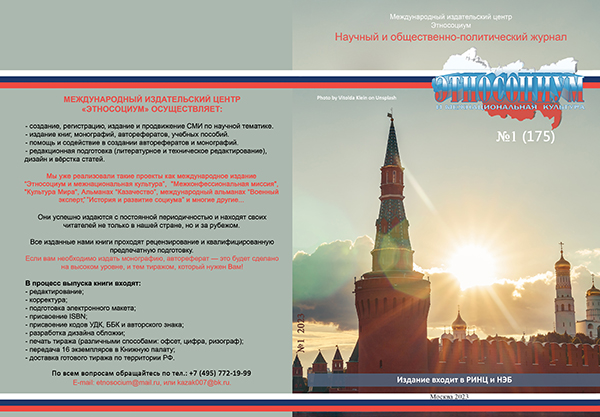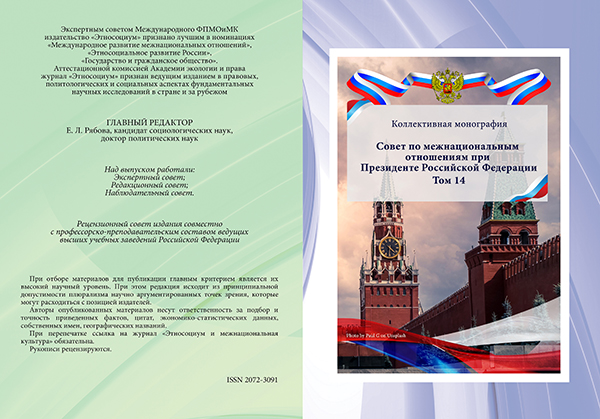

Content
|
SOCIOLOGY
|
|
|
Bakharev V.V., Ignatov M.A., Demenenko I.A. Communication practices of students in the internet space: problems and prospects
|
9
|
|
Bormotova T.M., Mazaev Y.N., Yudina T.N. Institutional problems of modern Russian society
|
18
|
|
Sorochan V.V., Gavrilyuk N.P. Digital sociology: from the digitalization of society to the digitalization of science
|
37
|
|
Trukhin A.S., Danakin N.S., Lesovik R.V. On the state of the Russian language in Iraq
|
47
|
|
Bormotova T.M., Yakovlev O.V. Dynamics of the information content of publications
|
54
|
|
Trukhin A.S., Danakin N.S. On the state and prospects for the development of Russian-Iraq trade and economic relations
|
64
|
|
Bakharev V.V., Demenenko I.A., Shavyrina I.V. Assessment of youth engagement in social entrepreneurship
|
72
|
|
CURRENT PROBLEMS OF MODERN SOCIETY
|
|
|
Davidenko Y.O., Nikonov S.B., Puiu Y.V. Theoretical substantiation of the phenomenon of intermediality in modern science
|
80
|
|
REGIONAL STUDIES
|
|
|
Makhmutova R.G., Shibanova N.A. Management of anti-terrorist activities: conflictological analysis based on the materials of the Republic of Tatarstan
|
86
|
|
Kunacheva F.G. Development of religious beliefs Abaza
|
102
|
|
INTERNATIONAL RELATIONSHIPS
|
|
|
Fadeeva A.V., Baichik A.V., Shafir T.V., Nikonov S.B. National culture as a tool for image formation Republic of Korea
|
110
|
|
Samadi S.K. Rationalism in the scholastic thinking of the Mu'tazilites
|
119
|
|
DISCUSSION CLUB
|
|
|
Asadulaev I.A., Kakhaev A.M., Sirazhudinova S.I. The role of the spiritual heritage of Sayfullah-qadi Bashlarov in the promotion of Sufism in Dagestan
|
128
|
|
REVIEW
|
|
|
Ponomarenko B.T. Sociocultural aspects of political development: history and modernity
|
133
|
|
Pismanik M.G. On cooperation between religious scholars and theologians
|
139
|
|
Abstracts
|
149
|
|
Authors
|
163
|
|
Requirements to materials submitted to the international publishing house "Etnosocium"
|
167
|
In the context of globalization and active digitalization of public systems, student youth, as the most active category, increasingly supplements real communication practices with virtual ones (online), using various social networks that are the dominant feature of young people's daily communication. In this article, the authors present the results of a sociological diagnosis of the semantic fields of the communicative practices of student youth of a regional university (BSTU named after V.G. Shukhov) on the Internet, as well as determining the vector of the most relevant communicative interaction of young people as the most progressive category of the population.
Keywords: student youth, social networks, communication practices, higher education.
The research is based on a secondary analysis of the results of sociological monitoring of the legitimization of political power. The purpose of the study is to identify the main institutional problems that undermine the legitimacy of the government and political institutions. The logic and strategy of the research is determined by the search for factors that determine the legitimacy of political institutions. The main result of the study was the construction of key indicators reflecting the reaction of society to institutional changes in modern Russia. The main conclusion of the study is that the basis for overcoming the institutional problems of Russian society and improving the efficiency of public administration is the development of the institutional environment by creating mechanisms for coordinating interests within the framework of public dialogue. This vector of development will make it possible to overcome the institutional traps hiding under the simulacra of democratic institutions arising on the basis of the institutional matrix of Russian statehood.
Keywords: institutional problems, public institutions, institutional traps, institutional drivers, institutional environment, legitimacy of power, stereotypes of mass consciousness.
The characteristics of culture and society have changed dramatically as new forms of communication, dependent on digital technologies, have spread, which have changed the way information is searched for and produced. However, the social sciences are still timidly analyzing this phenomenon, neglecting the impact of digital technologies on society and, above all, on the science of sociology itself. The article focuses on both technological changes and the spread of information and communication technologies that contribute to the rapid collection and analysis of information, data structuring, and trends in the participation of sociologists in the practice of developing tools, tools and technologies when conducting research in the realities of the 21st century - the century of digitalization, big data, virtual space that affects the perception of social phenomena and political processes.
Keywords: digital sociology, information and communication technologies, big data, social networks, Internet, sociological research, survey, interview, questioning.
The article reveals the place and role of the Russian language in the political, socio-cultural life of modern Iraq, describes the factors and problems of its development in the context of economic and cultural ties between the two countries.
Keywords: language situation, Russian language, sociolinguistic analysis, history of teaching the Russian language, problems and prospects of the Russian language in modern Iraq.
The article is devoted to the dynamics of some quantitative indicators and the study of blogs of information fields, informational occasions, the evaluation and analysis of information from electronic media, social networks and spheres.
Keywords: Internet monitoring, social networks, blogosphere.
This article discusses the state and prospects for the development of Russian-Iraq trade and economic relations, the difficulties arising from this and possible ways of their overcoming. The participation in the economic development of Iraq of such Russian industrial companies such as Lukoil, Gazprom Neft, Bashneft, Rosneft and others was accentuated. Problems and prospects of further cooperation are also identified.
Keywords: economics, trade, safety, development and exploitation of oil and gas fields.
The solution of various kinds of social problems of the public and private sectors of the economy is increasingly reduced to the implementation of social entrepreneurship as a qualitatively new way of socio-economic activity. Youth social entrepreneurship today acts as a vector for the development of innovations, strategic prospects for the development and implementation of socially oriented algorithms for the development of entrepreneurial activity. The authors of this article present the results of a sociological diagnosis of the involvement of youth in the Belgorod region in the field of social entrepreneurship.
Keywords: social entrepreneurship, youth policy, motives, self-realization, civic maturity.
The work focuses on studying the process of the evolution of the intermediality phenomenon in modern science, as well as defining the spectrum of interpretations for this concept and the identification of its conceptual features related to different fields of science and art.
Keywords: intermediality, intermedial system, intertext, transmedia.
The relevance of the problem of conflictological analysis of anti-terrorist activities lies in the need to prevent and reduce radicalization in society, develop alternatives for people affected by extremist ideology, and determine strategies for effective early response to potential risks of involvement in destructive communities.
One of the least developed problems today is the study of extremism and terrorism as a conflict that has its own dynamics. The values and norms of members of destructive groups are not compatible with the attitudes towards stability. The spreading ideology of extremism, and terrorism as its extreme form, reflect the interests of individuals and communities and become a way of expressing dissatisfaction, a means of resolving contradictions.
The purpose of the article is to identify alternative ways of resolving conflicts, the destructive way out of which is extremist, terrorist activity. To achieve this goal, the anti-terrorist activities carried out in the Republic of Tatarstan were analyzed through the prism of social conflict management. Based on the analysis of documents, expert interviews, and secondary data analysis, it was possible to determine ways to manage anti-terrorist activities.
The conflict theory of G. Simmmel [4, p. 494-516], L. Kozer [7, p. 168] conflict resolution Burton D. [2, p. 56]. Summarizing the approaches of these classics of conflictology to the nature of the conflict, we point out that its understanding is impossible without taking into account such factors as interests, emotions, identity.
The result of the work was a description of the management mechanisms of social conflict through the prism of extremism and terrorism. Alternative ways of conflict resolution among young people are proposed, based on the formation of resistance to other people's opinions, managing emotions, the ability to negotiate, propose solutions, which is a prerequisite for creating a trusting relationship between the subjects of prevention (parents, teachers, law enforcement agencies, interested departments). Conclusions are drawn about the need to develop an alternative to the "win-lose" strategy, which can be offered to persons at different stages of the dynamics of the conflict, the solution of which is extremism.
Keywords: conflict, extremism, risk groups, competencies, management, needs, social environment, identity.
The development of Abaza religious beliefs went through several stages: pre-monotheistic beliefs, closely intertwined with mythological ideas about the structure of the world, deities, the first man; Christianity, which played a role in the consolidation of the Abaza tribes; Islam, which became one of the identities of the Abaza people.
Keywords: pre-monotheistic beliefs, Abaza, Christianity, Islam, religion, North Caucasus.
From the middle of the last century, South Korea began to attract the attention of researchers in the fields of political, economic and social sciences. Surge of Korean popularity in the world is growing every year. Although Europe and America are key markets in transnational economic processes, Russia is also a target consumer audience for South Korea. Now Korean culture is very popular among Russian people. It became widespread and the audience is increasing. Previously the target audience was only teenagers. At the same time, people from different age groups become very interested in k-pop and korean goods. It is important to understand how this phenomenon affects the country's political image.
Keywords: soft-power, Korean Wave, cultural diplomacy, image.
The article analyzes the rationalism and its application in the Kalamite school of Mutazilism. The Mu'tazilites are the first scholastic group in Islam that sought to spread rational thinking in all areas of religious teaching, using a similar method of thinking to strengthen their dogma. Based on the results of this study, we found out that the Mu'tazilite experts of the kalam (scholastics) used two rational methods - philosophical and non-philosophical - to defend their beliefs indisputes.
Moreover, if the results of their rational conclusions differed from the external aspects of the Qur'an and the Sunnah, then the Mu'tazilites resorted to allegorical interpretations (ta'wil) of these results.
Keywords: Mu'tazilites, reason, rational thinking, Islam, philosophy, kalam, Scholasticism of the Mu'tazilites.
In the article, the authors reveal the role of one of the most prominent figures of science, culture and religion of Dagestan in the late XIX-early XX century, Sayfullah-qadi Bashlarov in the promotion of Sufism in Dagestan. The article attempts to focus attention on the significance of his works that have survived to this day, which are a significant, integral layer of the rich spiritual treasury of Dagestan, directly related to Sufism and inextricably linked with the theory and practice of Sufism.
Keywords: Sufism, Sayfullah-qadi Bashlarov, spiritual heritage, tariqa, Islam.
Review and analytical article about the content of the monograph under review. The issues that make up the main content of the monograph by S.V. Biryukov and O.V. Omelchenko, related to the influence of cultural factors on large-scale political and socio-economic changes, when culture is considered by the authors not just as a normative and regulatory principle, but as a mechanism for the response of Russian society to actual challenges to its primordial interests and the very existence of the state.
Keywords: state, dynamics, foreign experience, myths, society, politics, political crises, postmodernism, revolution, socio-cultural dynamics, factors.
Three sections of the article are filled with "questions" that arise in paired correlations between theology and religious studies. Response judgments are carefully reasoned, tactful, free from verbosity and categoricalness.
Keywords: theology, religious studies, religion, cooperation.